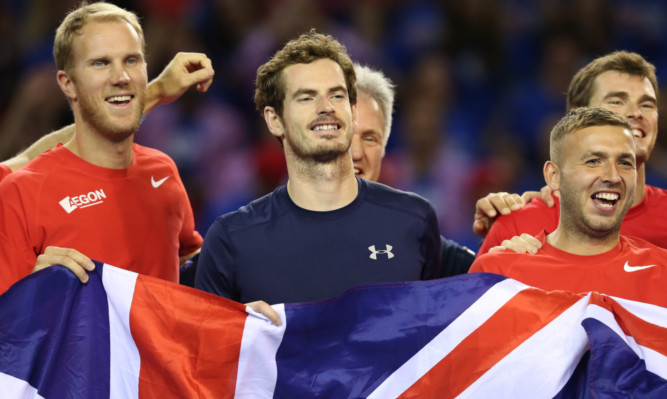There are many who deserve to bask in Davis Cup glory.
Great Britain’s place in a final for the first time in 37 years could not have been secured without Jamie Murray for one. He’s a world class doubles player and proved it in the five set Saturday afternoon nerve-shredder that was the decisive rubber in the semi-final against Australia that everybody expected it to be.
Big brother really is big brother when the siblings come together on Jamie’s terrain, a doubles court.
Then there’s James Ward. Horribly out of form in the last couple of months, that wasn’t the case back in March when Murray beat America’s John Isner in the Friday singles.
Dan Evans couldn’t do the same six months later against Bernard Tomic, but by extending the world number 23 to four sets he chipped away at Tomic’s confidence and fitness to soften him up for yesterday.
Leon Smith has hardly put a foot wrong since he was appointed captain. There’s a Paul McGinley-esque calm and no detail is too small about Smith. If there’s been a decision of significance that he’s got wrong on this Davis Cup adventure, nobody else has noticed.
And also deserving of a bit of (reflected) glory are the near-30 thousand who have packed the Emirates Arena over three days and created an unrelenting and deafening atmosphere that has been the very definition of home advantage.
But all of the above, and all of what the above have done, has happened before.
There have doubles specialists, unexpected singles wins, packed arenas, a decent captain (actually, I’m not so sure about that one). There have actually been two top 30 players in the team at the same time, Henman and Rusedski.
But there has never been an Andy Murray, a world class talent who brings his grand slam-winning dedication and game to the Davis Cup. And, if it’s possible, perhaps even elevates it. Murray has stretched the team notion of this competition as far as any player could.
The dedication bit isn’t a given for the top men, even though you might think it would be. Interest is often only piqued when the final is in sight.
The tennis tour is an unforgiving one, and spare weeks in an 11-month schedule are precious because of that. There are plenty who would have cited a tweak or a strain as a get-out for national service against France at Queen’s Club after a disappointment such as Murray’s at Wimbledon.
But a band of brothers bond with this GB squad, and an appreciation that by winning this competition he would complete a holy trinity of Olympics, Wimbledon and Davis Cup that only Rafa Nadal has achieved before him, has lit a fire for Murray.
The team needed three wins from him against Australia, and they got them. The doubles was touch and go for a while, but 6-0 in singles sets against Thanasi Kokkanakis and Tomic was a fair reflection of his dominance.
Was Murray’s tennis as point perfect in finishing off the semi-final yesterday as it had been in starting the ball rolling on Friday afternoon? It was a close call.
But, with his back aching from previous exertions, and the weight of responsibility as ever heaped on it, Tomic on day three represented a more daunting challenge than Kokkanakis on day one.
Tomic didn’t look the younger, fresher man as Murray raced to a 5-2 lead in the first set. But Murray had his break of serve cancelled out, and it wasn’t until the final game that he broke again to take the set 7-5.
If there had been a Murray wobble in the first set, albeit a brief and repairable one, there was nothing approaching that in the second. It was polished off with a stress-free 6-3. An early break to love in the third set confirmed that Tomic, whose spirit had long since been crushed, didn’t have a comeback in him. And it all ended 6-2.
Conventional wisdom tells us that in the modern day Davis Cup one player, no matter how good, can’t drag a team with him all the way to the trophy.
One more three out of three weekend in November and the boy from Dunblane, who defied logic by ending the most famous national sporting drought to win Wimbledon, will have challenged conventional wisdom again.
